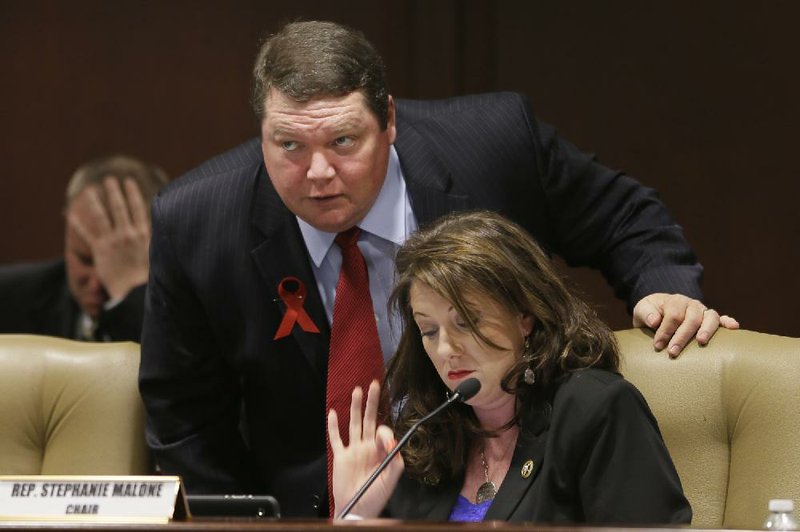The state House of Representatives voted 51-44 in favor of a bill that would require voters to show photo identification at the polls.
The vote came after the House Rules Committee decided earlier in the day that the measure had properly passed the Senate and was eligible for a vote on the floor.
Supporters of the bill said it only needs votes from only a majority of representatives and senators to pass. Opponents said it would need backing from two-thirds of lawmakers in each chamber.
Rep. Stephen Meeks, R-Berryville, told the House that Senate Bill 2, sponsored by Sen. Bryan King, R-Green Forest, would prevent voter fraud and allow voters who do not have a photo ID to cast a provisional ballot and later return to prove their identities.
Meeks said that the bill was “not something that’s just been thrown together” and had been debated for several hours in the committees that had considered it and in the Senate, where it passed Feb. 20 by a vote of 23-12.
“This bill is probably one of the most thoroughly vetted bills that we have discussed this session,” Meeks said.
Under the current law,poll workers ask for identification, but voters are not required to provide it.
The bill would require the secretary of state’s office to produce photo-identification cards for voters, which the Bureau of Legislative Research estimated would cost about $300,000 for hardware, supplies and training.
Rep. David Kizzia, D-Malvern, said he had several concerns about the bill, including opening up his constituents - especially elderly people - to financial identity theft because the measure allows them to provide a bank statement as proof of identity while voting by mail. Other ways a voter could show proof of identification in voting by mail would be by providing a utility bill, a government check, a paycheck or other government document.
Kizzia said he also opposed the measure because, under the bill, a voter who casts a provisional ballot would not have the vote counted if the ballot is challenged.
Rep. John Walker, D-Little Rock, said the bill had the “direct, overt intent to repress … representation, and it is very clear that that is what the bill is all about.”
“I do think, though, that it all comes back to one thing: Do you respect the way that the law and voting has evolved. Do you respect the fact that in Arkansas, too few people vote,” Walker said.
Speaking for the bill, Rep. Ann Clemmer, R-Benton, said there have been some “very poorly run elections” in the state, including those that have discriminated against her party.
In the past, some officials have worked “to keep Republicans from being in the voting place, from having primaries in public buildings,” Clemmer said.
After about an hour of debate, the House approved the bill. It now goes back to the Senate because it had been amended in the House.
Earlier in the day the House Rules Committee voted to find that the bill does not deal with voter-registration requirements found in Amendment 51 to the Arkansas Constitution and thus did not need a two-thirds vote to pass.
If the bill changed Amendment 51, it would need such a supermajority.
The question arose after Rep. Jim Nickels, D-Sherwood, objected to the bill when it arrived in the House. Speaker Davy Carter, R-Cabot, then referred the bill to the RulesCommittee so it could determine whether the bill had received enough votes in the Senate to proceed.
Some House Rules Committee members argued that SB2 doesn’t conflict with the state Constitution, so it did not need a supermajority to pass.
Others said the bill would depress voter turnout and cause some voters to be turned away from the polls.
The Rules Committee, meeting just after noon Wednesday, by a voice vote, decided that the bill needed only a majority to pass.
Carter noted that similar legislation has been approved in other states. He said that,after reading court decisions from Georgia and Indiana, he thinks Arkansas’ bill would stand up to a challenge in court.
“If that is the course that’s taken, then we’ll see at some point,” Carter said. “I don’t think anybody can say, ‘Hey, you are sending out legislation that’s just blatantly unconstitutional,’ when you have two other state Supreme Court decisions that state otherwise.”
Front Section, Pages 1 on 03/14/2013
